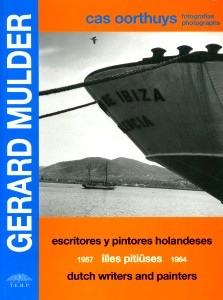|
Escritores
y pintores holandeses en las Pitiusas 1957-1964 = Dutch
writers
and painters in the Pityuses 1957-1964 / Gerard
Mulder ;
introducción/preface : Martin Davies & Paul
Wienen ; fotografías/photographs : Cas
Oorthuys. -
Sant Josep (Eivissa) : T.E.H.P., 2002. -
158 p. :
ill. ; 23 cm. - (Viajeros a las islas, 2).
ISBN
84-88339-09-7
|
|
Au début de la
seconde moitié du XXe
siècle, et avant l'irruption du tourisme de masse, un groupe
d'écrivains et d'artistes néerlandais s'est
constitué à Ibiza et à Formentera.
Pour Gerard
Mulder qui relate l'histoire de ce mouvement informel,
Jan Gerhard Toonder (1914-1992) fait figure de pionnier ;
auteur
de romans, de nouvelles et de poèmes, il fut très
vite
suivi par Cees et Fanny Nooteboom, Bert et Margreetje Schierbeek, Hugo
et Elly Claus …
Entre 1957
et 1964, l'île
accueillit plus ou moins durablement écrivains et peintres,
acteurs et actrices de théâtre ou de
cinéma,
chanteurs, musiciens et mannequins — tous en quête
de
soleil et de lumière, d'un mode de vie
libéré des
contraintes bourgeoises.
Romans,
nouvelles, poèmes,
journaux et mémoires rendent compte de cette
expérience
originale mais, faute de traduction, la plus grande part n'est
accessible qu'aux néerlandophones, à l'exception
notoire
de quelques œuvres d'Hugo Claus et de Cees Nooteboom
(traduites
en français) et de Jan Cremer (en anglais).
|
| EXTRAIT |
Even
the journey to Ibiza was for many a sort of rite of passage. Harry
Mulish still remembers the pleasant shock he experienced on waking up
aboard the night-train from Paris and gazing out on the Mediterranean
landscape for the first time, the dazzling sunshine and the white
houses. « I felt I was nearing the lands of
Classical
antiquity ». For Jan Gerhard Toonder too, the train
journey
represented a passage from the old to the new.
The
train eventually left Toulouse, heading east towards the sea, and one
suddenly became aware of the light ; the night was left behind
in
that station and with it all the anguish of the past.
Jan Gerhard Toonder, Een spin in de
badkuip [A spider in the bathtub]
“ The
mere fact that you were financially able to make that journey indicated
that the post-War period was over ” (Mulish). For
Harry
Mulish it was his first real holiday using money earned from his own
efforts. […]
The last
part of the trip, the journey from
Barcelona to Ibiza, was almost always by ship. Although there was an
air connection from Barcelona, few used it, not just to save cash, but
also because neither planes nor staff were particularly reassuring.
[…]
So it was
usually the Jaime
I. “ Memories
of moonlight nights, the ship rolling slightly in the mild swell, the
whole night on deck, speaking with Hans Verhagen about
poetry ” (Sleutelaar), but also of “ swimming in
green vomit on arrival ” (Hugo Claus who was
seasick). The
majestic moment when the ship let its anchor down into Ibiza bay and
slowly turned round the chain until it came up against the quayside.
And unfolding above all, the panorama of the white town on its hill.
☐ pp. 96-97 |
|
| COMPLÉMENT
BIBLIOGRAPHIQUE |
- Gerard
Mulder, « Literair Ibiza »,
Amsterdam : Thomas Rap, 1989
|
- Hugo
Claus, « Schaamte »,
Amsterdam : De Bezige
bij, 1972 ; « Honte » trad. du
néerlandais
par Alain Van Crugten, Arles : Actes sud, 1987 ;
Paris :
Librairie générale française (Le Livre de
poche, Biblio, 3130), 1990
- Jan
Cremer, « Ik Jan Cremer, tweede
boek »,
Amsterdam : De Bezige bij, 1966 ; « Jan
Cremer writes
again » transl. by Jon Lulius, New York :
Grove press,
1971
- Cees Nooteboom, « De ridder is
gestorven », Amsterdam : Querido,
1963 ; « Le
chevalier est mort » trad. du néerlandais
par Louis
Fessard, Paris : Denoël, 1967 ; « Le
chevalier est mort » trad. du
néerlandais par
Christian Marcipont, Paris : Calmann-Lévy, 1996
|
|
|
| mise-à-jour : 30
avril 2019 |

|
|
|
|